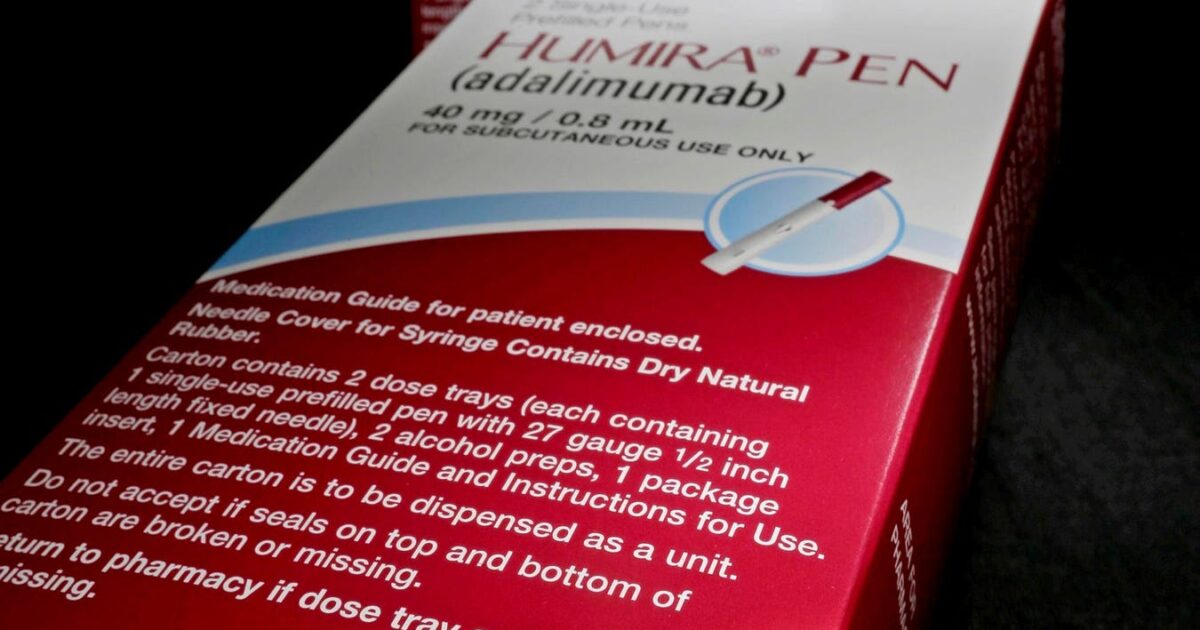Dutch Court Case On Humira Assesses Whether Its Price Was `Excessive’

Packaging for AbbVie’s drug, Humira (adalimumab). The Pharmaceutical Accountability Foundation in … More
In a unique legal challenge, the Dutch Pharmaceutical Accountability Foundation is taking on the manufacturer of Humira (adalimumab), AbbVie, in a Dutch court today, May 9th, for alleged excessive profiteering. The Foundation is not seeking financial damages. Rather it wants a panel of judges to rule on the principle of what constitutes a reasonable profit. At the heart of the case is the question of whether there ought to be limits to what a company can charge for medicines.
The Foundation accuses AbbVie of “abusing” its dominant position in the market as a monopoly to make excessive profits, hereby also violating certain “human rights,” such as people’s “right to health.” In this context, the plaintiff calculated such profits by subtracting from the revenues—AbbVie’s Humira sales in the Netherlands were €2.1 ($2.36) billion from 2004 to when the product’s patent expired in 2018—research and development, production and distribution costs, and what the Foundation opined is a “fair” profit, leaving €1($1.13) billion as “excess.”
The Pharmaceutical Accountability Foundation is an independent, public good foundation under Dutch law that says it works to “ensure equitable, affordable access to medicines for all.”
Humira has been a blockbuster medication worldwide for two decades. The biologic has multiple indications, including rheumatoid arthritis, Crohn’s disease and psoriasis. Humira still has billions of dollars in sales in the United States, where biosimilar traction has been slow, due initially to litigation which prevented biosimilars from entering the market until 2023 and subsequently a sub-optimally operating drug supply chain. Humira’s market share remains quite high at 70% despite the competition. In addition, biosimilar discounts aren’t as steep as they are outside the U.S., including the Netherlands.
The Dutch Healthcare Authority, an agency of the Dutch Ministry of Health, Welfare and Sport released a report last month which noted that annual per patient spending on adalimumab-based products in the Netherlands fell nearly 90% in 2018, from €10,400($11,713) during Humira’s patent period to €1,300($1,464) once biosimilar competition was introduced.
Biosimilars are very close in molecular structure and function to their referenced, brand name originator biologic medicines. There are also no clinically meaningful differences in effectiveness. Humira is an originator with numerous referenced biosimilars.
In an initial court proceeding in 2023, the Foundation accused AbbVie of engaging in “unfair, excessive pricing practices.” It invoked the importance of considering opportunity costs when evaluating expenditures on Humira: “The Dutch government has set a maximum budget for healthcare. That means you have to make choices. You can only spend every euro once. And we see that because drug manufacturers charge too high a price, other drugs or services cannot be delivered.” Moreover, the Foundation suggests that ordinary Dutch citizens are negatively impacted financially, as they “pay for the [excessive profit], through higher and higher [health insurance] premiums.”
The Foundation’s long-term goals are to establish legally enforceable regulations that ensure medicines are fairly priced at “socially acceptable” levels. Additionally, the organization seeks a way to mandate more transparency from pharmaceutical firms with respect to research and development costs, the share of public funding and profit margins.
AbbVie has said in response to the legal complaint that it acts in accordance with all Dutch laws and regulations. The company categorically rejects the Foundation’s allegations. Furthermore, AbbVie says that the costs of failed development projects, expansion of indications and related studies have not been adequately accounted for in the plaintiff’s argument. Nor were appropriate discounts negotiated with healthcare providers included in the calculations, according to AbbVie.
Te defendant also takes issue with allegations that Humira’s price was “too high.” In the Netherlands, when a drug launches, manufacturers face multiple entities, including the National Health Care Institute and the Ministry of Health, Welfare, and Sport, with whom they negotiate the medication’s pricing and reimbursement. Presumably, at the time Humira launched, AbbVie negotiated an acceptable price with the relevant authorities.
Generally, profiteering or price gouging is considered the practice of increasing the prices of goods to a level “much higher” than is considered “reasonable or fair.” More often than not, the term is associated with sellers taking advantage of circumstances that decrease supply. This would include, for example, emergencies causing severe supply-side constraints. While Humira did enjoy a period during which it was a monopoly, which lasted until 2018 in Europe, there weren’t any supply limitations per se that AbbVie would have been exploiting. This in turn raises questions about whether the Foundation’s reasoning regarding “excessive profits” will be accepted in court.
Nevertheless, the overarching problem of rising expenditures on what the government calls “expensive drugs” has worsened recently. In the eyes of the Foundation this may be exacerbated by “unreasonable prices” which make it harder to maintain a sustainable healthcare system in which there is universal access to an essential package of benefits.
If the Foundation’s challenge is successful, this could establish a precedent in the Netherlands, and perhaps Europe more broadly, on price and profit limits. A decision by a panel of judges on whether AbbVie acted unlawfully is expected in six to 12 weeks.
